The global MV camera market was valued at $2.6 billion in 2021 and is projected to reach $6.5 billion by 2031, growing at a CAGR of 9.9% from 2022 to 2031
Machine vision cameras are considered the eyes of visual quality inspection systems. By automating operations, enhancing their speed and throughput, and making them more precise, predictable, and repeatable, cameras and machine vision technologies contribute to performance improvement. The camera-based inspection also makes continuous quality assessments possible, allowing for the rejection of flaws and the detection of process deviation. Machine vision systems and cameras can be particularly efficient at a range of activities, including gauging, guiding, identification, and inspection, for quality control applications. A level of automation, consistency, reliability, and accuracy that is 24 hours a day and beyond the capacity of human perception is also made possible by machine vision cameras. In addition, robots make extensive use of Meraki cameras and Meraki MV2, which are perfect for tasks that are difficult, hazardous, or tedious for human workers.

The global MV Camera industry is expected to witness notable growth during the forecast period, owing to an increase in demand for vision-enabled robotics systems. Furthermore, a rise in opportunities for Industry 4.0 across the manufacturing sector and the increase in the use of machine vision cameras in non-industrial sectors, is expected to propel the market growth during the forecast period.
However, the high cost of maintenance and lack of skilled professionals is one of the prime factors that restrain the global machine vision camera market growth. On the contrary, the rise in the adoption of vision systems in medical and life science research is expected to provide lucrative opportunities for the growth of the market during the forecast period.
The MV camera market is segmented into Vision type, Sensor Type, Platform Type, Camera Type, Application, and End Users.
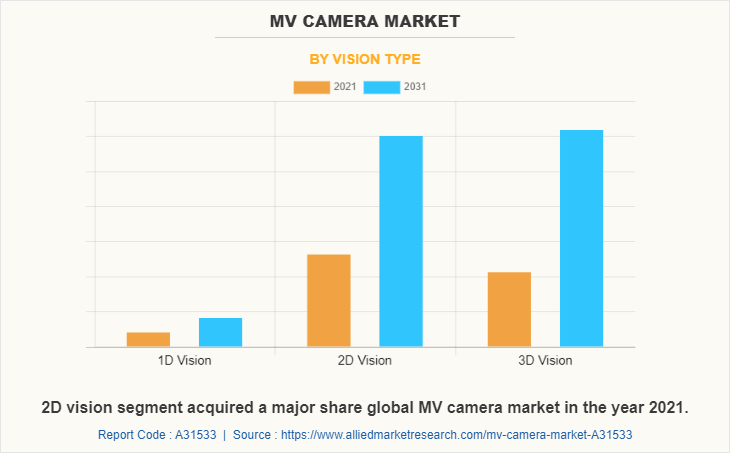
On the basis of vision type, the market is divided into 1D vision, 2D vision, and 3D vision. The 2D vision segment acquired a major share in 2021 and is expected to grow at a high CARG during the forecast period.
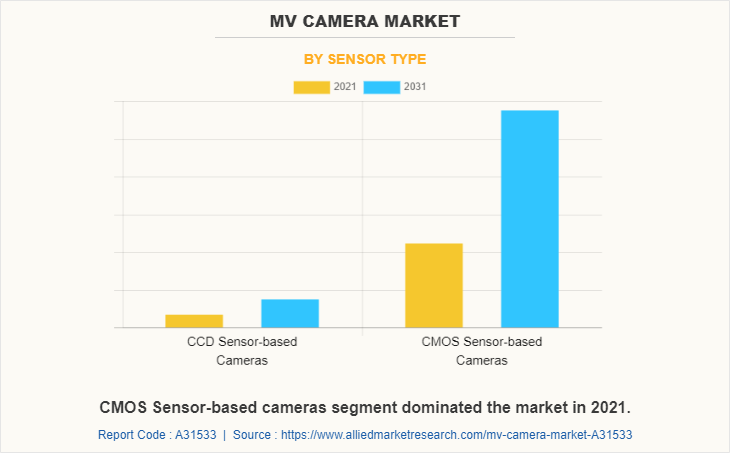
By sensor type, the MV Camera market growth is segmented into CCD Sensor-based cameras and CMOS Sensor-based cameras. The CMOS Sensor-based cameras segment acquired the largest share of the market in 2021.
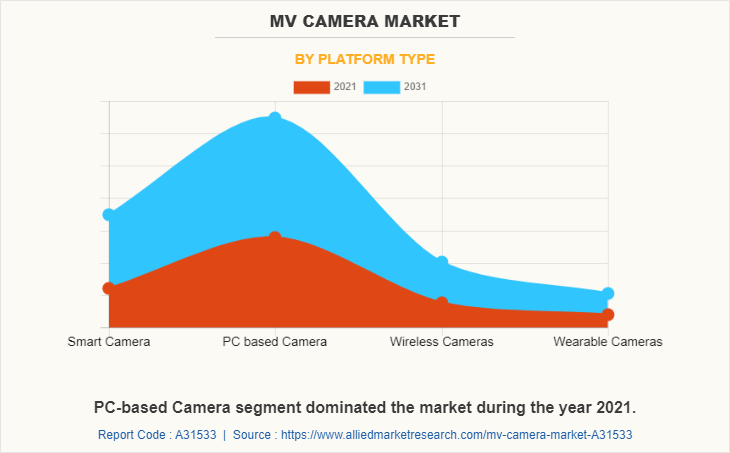
By platform type, the MV Camera market forecast is segmented into smart cameras, PC-based cameras, wireless cameras, and wearable cameras. The PC-based segment accounted for the largest market share in the machine vision camera industry in the year 2021 and is expected to follow the same trend in the coming years.
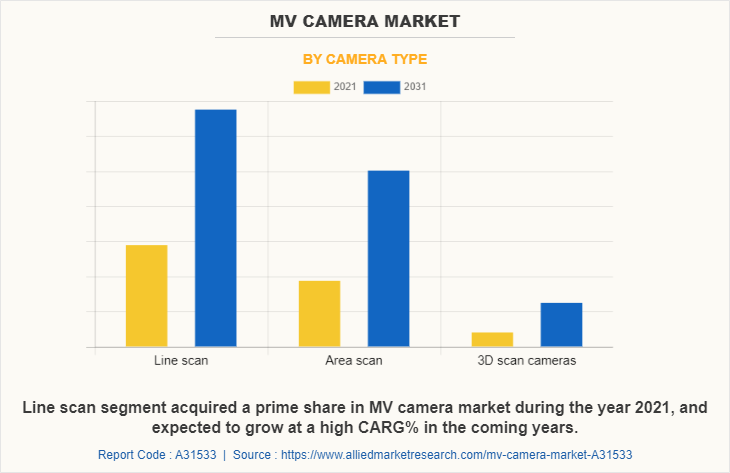
By camera type, the MV Camera market size is segregated into line scan, area scan, and 3D scan. The line scan segment held a prime position in the market in 2021.
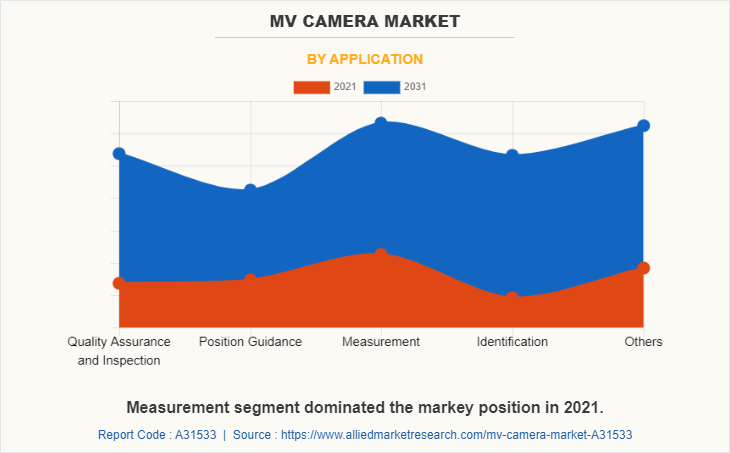
On the basis of application, the MV Camera market opportunity is divided into quality assurance & inspection, position guidance, measurement, identification, pattern recognition, and others. The measurement segment accounted for the largest share of the market in 2021 and is expected to follow the same trend in the coming years.
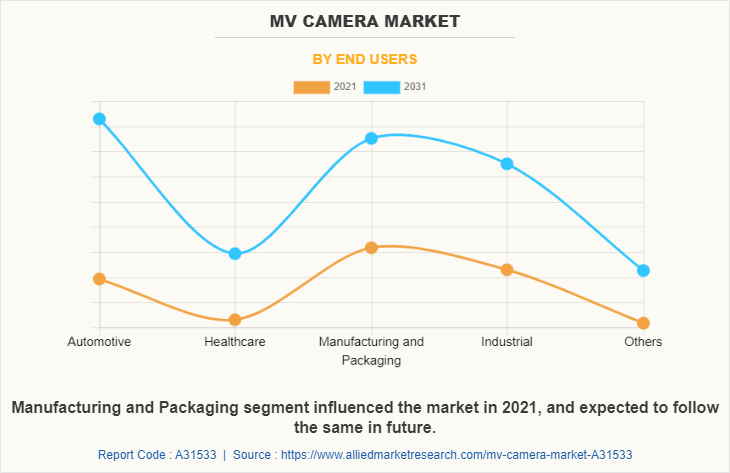
On the basis of end-user, the MV Camera market outlook is segmented into automotive, healthcare, manufacturing & packaging, industrial, and others. The manufacturing & packaging segment acquired the largest share in 2021, and the automotive segment is expected to grow at a high CAGR from 2022 to 2031.
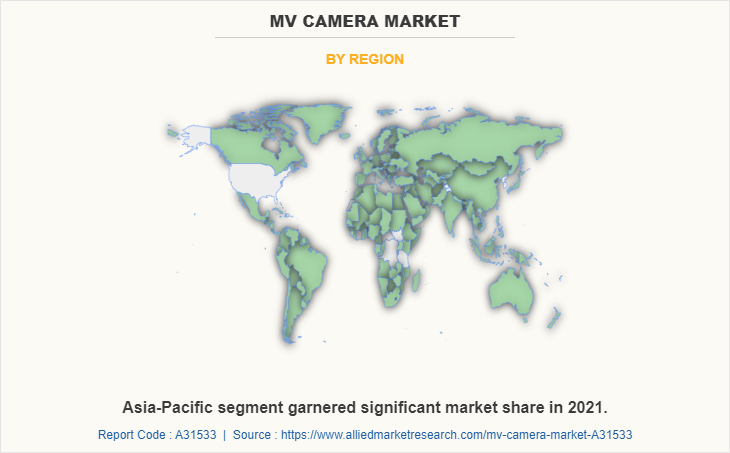
Region-wise, the MV Camera market share is analyzed across North America (the U.S., Canada, and Mexico), Europe (the UK, Germany, France, Italy, Spain, and the rest of Europe), Asia-Pacific (China, India, Japan, Australia, South Korea, and rest of Asia-Pacific), and LAMEA (Latin America, the Middle East, and Africa). Asia-Pacific, specifically China, remains a significant participant in the global MV camera industry. Major organizations and government institutions in the country are intensely putting resources into the technology to develop next-generation machine vision camera solutions such as Cisco Meraki camera.
Competitive analysis and profiles of the major global Machine Vision Camera Market players that have been provided in the report include Cognex Corporation, Basler, Omron Corporation, Keyence Corporation, Teledyne Technologies, TKH Group, National Instruments, Sony Corporation, Texas Instruments, Intel Corporation, ISRA VISION AG, SICK AG, Microsoft Corporation, AMETEK Inc., Qualitas Technologies, viso.ai, and Zivid & Pick & Place.
Key Benefits For Stakeholders
- This report provides a quantitative analysis of the market segments, current trends, estimations, and dynamics of the mv camera market analysis from 2021 to 2031 to identify the prevailing mv camera market opportunities.
- Market research is offered along with information related to key drivers, restraints, and opportunities.
- Porter's five forces analysis highlights the potency of buyers and suppliers to enable stakeholders to make profit-oriented business decisions and strengthen their supplier-buyer network.
- An in-depth analysis of the mv camera market segmentation assists to determine the prevailing market opportunities.
- Major countries in each region are mapped according to their revenue contribution to the global market.
- Market player positioning facilitates benchmarking and provides a clear understanding of the present position of the market players.
- The report includes an analysis of the regional as well as global mv camera market trends, key players, market segments, application areas, and market growth strategies.
MV Camera Market Report Highlights
| Aspects | Details |
| Market Size By 2031 | USD 6.5 billion |
| Growth Rate | CAGR of 9.9% |
| Forecast period | 2021 - 2031 |
| Report Pages | 387 |
| By End Users |
|
| By Vision type |
|
| By Sensor Type |
|
| By Platform Type |
|
| By Camera Type |
|
| By Application |
|
| By Region |
|
| Key Market Players | basler ag, SICK AG, Cognex Corporation, Texas Instruments Inc., KEYENCE CORPORATION, Teledyne Technologies Inc., national instruments, viso.ai, ISRA VISION AG, Microsoft Corporation, Ametek Inc., TKH Group, Sony Corporation, qualitas technologies pvt ltd, Intel Corporation, Zivid, OMRON Corporation |
Analyst Review
The machine vision camera market is witnessing significant growth, owing to growth in investments in medical and life science research. Further, the rise in investments in security and surveillance significantly propels the growth of the global machine vision camera market. The market for machine vision cameras is expanding, owing to the rise in global use in non-industrial sectors.
Machine vision technology is becoming an essential component of industrial automation, owing to an increase in robotics and smart manufacturing. The use of industrial robots in the automotive and consumer electronics industries has also increased significantly, which has increased demand for integrated machine vision systems with vision-guided robot controllers. Therefore, the competitive environment in this market is expected to further intensify with an increase in technological innovations, product extensions, and different strategies adopted by key vendors.
The rise in demand for investments by prime players in non-industrial sectors such as retail, traffic control, and agriculture is enhancing machine vision camera solutions. Thus, it is anticipated to propel the growth of the machine vision system market for non-industrial sectors during the forecast period.
Globally, various key players and government agencies have invested in the machine vision camera market that strengthens their share in the market.
Asia-Pacific, specifically China, remains a significant participant in the global machine vision camera industry.
The measurement segment accounted for the largest share of the market in 2021 and is expected to follow the same trend in the coming years.
The global machine vision camera Market was valued at $2569.5 million in 2021 and is projected to reach $6500.3 million by 2031, registering a CAGR of 9.9% from 2022 to 2031.
Significant factors that impact the growth of the global machine vision camera market include increasing demand from vision-enabled robotics systems, technological advancement in Industry 4.0 across the manufacturing sector, and a rise in the use of machine vision cameras in non-industrial sectors are some of the key market trends.
Cognex Corporation, Omron Corporation, Teledyne Technologies, and ISRA VISION AG are some of the top companies to hold the market share in MV Camera
Loading Table Of Content...



